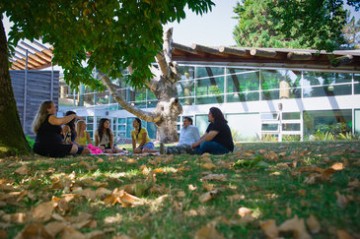The University engages Aboriginal people in mutually supportive and productive relationships, and works to integrate understandings of Indigenous cultures and histories into its curriculum and operations.
We are connected to this place …. We are the land, and the land is us.
Musqueam: A Living Culture
The promise of this place is made to us all. In respect of the Musqueam and Okanagan lands on which the University sits, and with all voices raised to tell a new story, UBC advances educational opportunities with and for Aboriginal people on its campuses and in the wider community.
In response to the expressed needs and aspirations of Aboriginal peoples, UBC engages in research and generates curricula across the University that respect, reflect, and include Aboriginal cultures, histories, and systems of knowledge. In both academics and operations, the University addresses issues of ignorance and misunderstanding resulting from the educational failures of the past.
The University strives to ensure that Aboriginal students, staff, and faculty find their perceptions and experiences echoed in the classroom, on campus, and among their peers. Out of an environment of opportunity and support emerge new Aboriginal role models who light the way for future generations of scholars and citizens.
The promise of this place is true in any language:
![]() (Musqueam)
(Musqueam)
![]() (Okanagan)
(Okanagan)
Welcome.
Action
- Expand curriculum offerings focusing on Aboriginal issues and perspectives
- Expand the professional development available to administrators, faculty, staff, and students in working productively with Aboriginal colleagues and discussing Aboriginal issues
- Increase hiring of highly qualified Aboriginal faculty and staff
- Strengthen programs supporting the entry, academic success, social support and wellbeing of Aboriginal students
- Create and support programs that help prepare Aboriginal students for post-secondary education
Outcome
- Faculty offerings have expanded, some examples include:
- New Indigenous Community Planning Specialization in the master’s degree in planning was launched by the School of Community and Regional Planning
- The Faculty of Law now requires that all students complete curriculum in constitutional law that addresses Aboriginal rights
- A new Aboriginal Education course is now required for all students in the Teacher Education Program
- Aboriginal Initiatives at the Centre for Teaching, Learning, and Technology has expanded its year-long professional development series focusing on teaching and research practices around Aboriginal issues in curricular settings - An interactive learning exhibition on the Berger inquiry engaged more than 400 UBC students from diverse faculties and secondary school students in conversations surrounding the Mackenzie Valley Pipeline and the struggle for Aboriginal rights in Canada
- At least three new Indigenous tenure-track faculty members and two staff members have joined UBC
- At least 134 new to UBC Aboriginal undergraduate students started classes at UBC in September 2012, up from 117 in 2011
- In addition to two $20,000 awards launched last year, seven new $5,000 major entrance scholarships for Aboriginal students entering first year programs have been created
- In September, UBC and Langara College launched the UBC-Langara Aboriginal Transfer Program to provide Aboriginal learners a pathway from college to university; it also offers scholarships, guaranteed admissions, and cultural supports
Action
- Develop critical community partnerships centered on initiatives of high value and priority for Aboriginal communities
- Strengthen and expand research of benefit to Aboriginal communities developed with significant community collaboration
- Strengthen and expand student involvement in Aboriginal community-based research and service learning with Aboriginal organizations
- Create venues for dialogue with Aboriginal communities, and the broader public, on significant issues
- Provide faculty and staff with the means and professional development opportunities to effectively collaborate with Aboriginal individuals and communities
Outcome
- The Community-Based Research Task Force submitted its report to the Executive and Dr Judith Lynam has been appointed to develop a set of implementation steps to support community-based and Aboriginal research
- An Aboriginal Health Strategy Working group has been created to work towards a more integrated approach to UBC’s Aboriginal health initiatives
- An important focus of the Aboriginal Health Strategy working group is creating meaningful partnerships with communities around issues important to Aboriginal people in BC
- In September 2013, the Truth and Reconciliation Commission will hold its final West Coast national event in Vancouver and UBC has approved the suspension of classes for one day to allow the university community to participate. Planning is underway to incorporate the event into curriculum and other programming.
- UBC and the University of Manitoba bid to set up a permanent Truth and Reconciliation Commission National Research Centre; if successful, UBC will establish a west coast centre that will provide access to Indian Residential School records and testimony, and develop educational materials and public information
